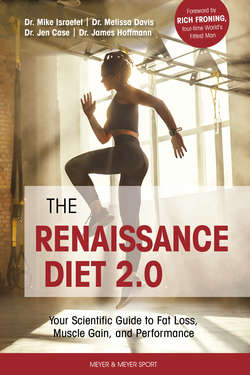Читать книгу The Renaissance Diet 2.0 - Mike Israetel, James Hoffmann - Страница 89
На сайте Литреса книга снята с продажи.
Protein Quality
ОглавлениеSources of protein can also be ranked based on the types and ratios of amino acids they provide. A food source containing all the essential amino acids is termed complete. Sometimes, particularly in the case of vegan diets, two or more protein sources are needed to get all the essential amino acids in adequate amounts. Multiple protein sources that together contain all essential amino acids are called complementary. While all animal sources are complete, most plant sources are not. Consumption of complete protein at every meal is not likely to have a large effect on health so long as the needed amino acids are consumed on average in the appropriate daily amounts. For body composition and performance concerns, however, getting enough of all essential amino acids at every meal is valuable and recommended for best muscle growth or retention.
Protein Digestibility-Corrected Amino Acid Score (PDCAAS) is the gold standard for evaluating the quality of a protein source. This method takes into account both the essential amino acid content and the digestibility of the protein. A score of 1 is the highest possible score and means that the protein source contains all the essential amino acids and can be fully digested such that all of the amino acids can be absorbed when that source is eaten. Quality of protein decreases with PDCAA score down to 0. A food with a score of 0 would provide no accessible essential amino acids. Table 5.1 is a list of some protein sources and their PDCAA scores.
Table 5.1 A list of some example protein sources and their PDCAA scores
| Protein Digestibility-Corrected Amino Acid Scores (PDCAAS) | |
| Milk proteins (casein, whey) | 1.00 |
| Egg protein | 1.00 |
| Soy protein isolate | 0.99 |
| Mycoprotein (fungus-based vegan protein) | 0.99 |
| Beef | 0.92 |
| Chickpeas | 0.78 |
| Black beans | 0.75 |
| Peanuts | 0.52 |
| Rice | 0.50 |
| Whole wheat | 0.42 |
| Wheat gluten | 0.25 |
